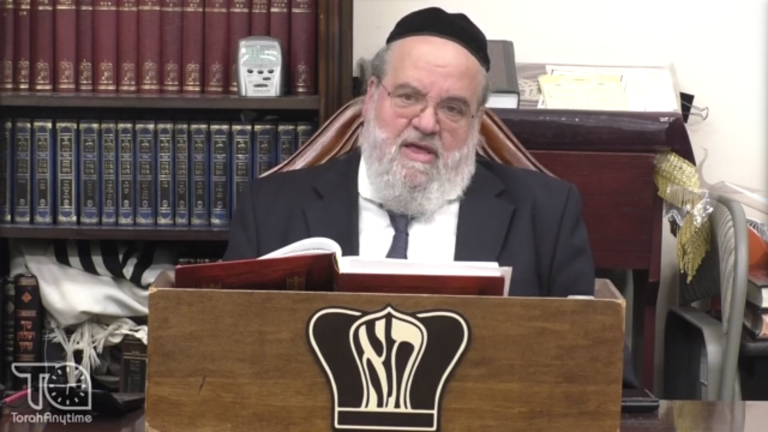Vayechi 5785: Bitachon: Our Only Hope
Sponsored
Do You Want the Zechus of Sichos Yisroel Distribution in all of Lakewood??
Sponsor Weekly Distribution!
Consider sponsoring a shiur
Visit YTATorah.org
Shiurim given in 5777
A Person Gets Everything Bekivuy
There are a lot of hints that Yaakov Avinu foresaw the future of Klal Yisrael, and he mentioned them in the birchas Yaakov. Chazal tell us (Medrash Rabbah; Bereishis 98:14) that Yaakov Avinu foresaw how Shimshon Hagibor will defeat the enemies of Klal Yisrael in an unbelievable way, וסבור בו שהוא מלך המשיח, and Yakov thought that Shimshon was going to be the Moshiach, but כיון שראה אותו מת, since he saw that Shimshon was going to die, Yaakov Avinu realized he’s not going to be the Moshiach. So, what did Yaakov Avinu say next? He said, ‘לישועתך קויתי ה “I hope for Your yeshuah,Hashem.”[i]
Now, the medrash continues. It’s a moradike Chazal that needs to be studied in depth and at length. אמר רבי יצחק, Rabbi Yitzchak says, הכל בקיווי, everything a person gets is bekivuy (with hope). The mefarshim explain כלומר, that means to say, שאפילו אין אדם כדאי, that even if a person is not worthy,and doesn’t see a zechus to merit what he wants, זוכה, he could still be zocheh לכל המתנות, to all the matanos, all of the gifts. How? בזכות הקיווי, in the merit of hoping to Hashem, being ‘מקוה אל ה which means, בזכות האמונה והבטחון, in the merit of emunah and bitachon. And that was the message of Yaakov Avinu when he said ‘לישועתך קויתי ה – that even if Klal Yisrael won’t be so worthy of geulah and yeshuah, מכל מקום, still in all,תהיה הישועה בזכות הקיווי והבטחון, the yeshuah will come בזכות הקיווי. And the medrash goes on and brings a list of things a person can attain or achieve through kivuy.
We have to understand what’s the chiddush, what’s the novelty in this Chazal? It seems a person could not be zocheh, not kedai, and not rauy to receive something, but if he has tikvah (hope) and he puts his bitachon in Hashem, then Hakadosh Baruch Hu will assist.
We Need Bitachon to be Zocheh to Matnas Chinam
Now, there is a concept of people being somech on the otzar of matnas chinam.[ii]Hakadosh Baruch Hu has a tremendous otzar, storehouse, and it’s an otzar which is for matnas chinam, where Hashem gives out free gifts. But in order to get those free gifts you have to have some zechus. And what is that zechus? You have to have tikvah. You have to be mekaveh, hope to Hashem because you trust in Hashem. In other words, even though a person doesn’t deserve something mishuras hadin because he doesn’t have ma’asim tovim, he’s lacking zechusim, but he could still receive it from Hakadosh Baruch Hu על ידי מתנת חינם. And how do you get matnas chinam? על ידי הקווי ובטחון.
Now, you have to understand that there are many people who’ve heard about this matnas chinamdike thing and they think it’s a Get Out of Jail Free card. They think that even if they’re not zocheh, everything’s going to work out fine. But they aren’t ‘מקוה אל ה, they don’t put their bitachon in Hashem. Let me explain.
Here’s a fellow who’s driving fast. He’s driving without seichel. He’s driving while talking on his phone and texting. Plus, he’s not wearing a seatbelt, and so on. All of a sudden, he sees the lights go on behind him, and he wants to know what’s going on. “Oh, boy,” he says. “Oh, that’s it. I’m finished.” So he tries some bobbe ma’aseh. He opens the window and the cop says, “Sir, you know why I’m stopping you?” First, he says, “No, I have no idea why you’re stopping me.” The cop tells him all the counts he did wrong. He says, “Officer, do you think you could find it in your heart to have a little mercy on me? Come on. My wife’s having a baby.” The cop says, “Your wife? What wife?” He says, “The wife I’m going to get in a couple of years. I’m sure when I get married, she’ll be having a baby at some point in time, so please, can you have some mercy.” You hope if you make a shtickel joke maybe the cop will like your jokes. Or you say, “Oh, I’m in a rush. I’m going to a funeral.” The cop says, “Whose? Your own? If you’re texting and talking on the phone, I think you’re going to your own funeral.” You make more jokes and think: I’m hoping that with my cavalier attitude, maybe I can get out. That’s not bitachon. That’s called stupidity. That’s called a guy who’s looking for a job but doesn’t even attempt to find one and just stays home. He says, “I’m sure the job will come to me in my house.”
Bitachon is something totally different. Bitachon is when the cop stops a guy and opens the window and he looks at the cop and says, “Is that you, Jack?” And he says, “Yes, it is, Sir. Good morning.” Now, Jack happens to be the guy’s neighbor. He says, “Jack, I didn’t know you work for the police. I didn’t know you were an officer in the traffic division. Jack, you know, we’re neighbors. Do you think you could help me out here?” Jack says, “Let me look at your record and see how bad you are. Let me check this out.” And the guy now has a shtickel bitachon. He’s boteach in this guy because the guy is his neighbor. He mowed his lawn. He helped him out. He took care of him in the past. That’s bitachon. That’s already called you’re boteach in something, in this case a person. You’re boteach because you have a relationship with this fellow. (Now, you know you didn’t do the right thing – i.e., you brake mutiple traffic laws. You know you crossed the line big time. What you did was very illegal. But even though you didn’t do the right thing, you can still rely on your relationship with this fellow to let you off the hook.) That’s called having bitachon. You rely on something. But if a guy simply says, “Hashem, I heard You have a free otzar matnas chinam. Could You cut me some slack here? Can You give me some freebies here?” No, there are no freebies. But if you have a bitachon, where you truly rely on Hashem, that’s a different story.
Saved From A Ticket By Bitachon
Here’s a true story: Last Friday, a fellow went to pick up his son from somewhere. He put his four-year-old son in the back seat of the car without buckling him in. Then he went to the front seat, didn’t put on his seatbelt, and started to drive. Somebody called him on the phone. He picked it up and started to shmooze. He told the guy, “Let me send you a text.” So he started to text while driving. Before long, a cop stopped him. The cop came behind him and said, “You know why I stopped you?” “No, I’m not sure. Why?” He said, “You just went through a stop sign. You rolled straight through a stop sign, so I’m stopping you.” Then he said, “Why are you talking on the phone? Why are you texting? How come your seat belt is not buckled? How come your child is not buckled in?” He got him on six counts.
The fellow turned to the cop. First, he tried to be boteach b’nedivim. He said, “Do you think you can have mercy on me today?” The cop said, “You want mercy? You don’t come to the police for mercy. Police don’t give mercy. We mete out justice. No mercy. Give me your license and registration.” So the guy fumbled for his registration. He couldn’t find it. He only found his old registration. “Give me the old registration.” The cop left him and went back to his car. He turned to his son and told him, “You see what just happened? No mercy from people, but let’s ask mercy from Hashem.” And he shut his eyes and started to talk to Hashem. “Hashem,” he said, “I know I messed up royally. I know I’m totally wrong, but Hakadosh Baruch Hu, I heard from my rebbi so many times that if I’m boteach in Hashem and mekaveh to Hashem, I can expect mercy from You.
“You’re the Almighty, and You’re the All-merciful. Hashem, could You have some rachamim on me? Hakadosh Baruch Hu, be merachem alai.”Ten minutes and he was going mamash shtark. He saw the cop getting out of his car, holding the ticket. He walked up to the car and knocked on the window. The guy rolled down the window and said, “Sir, I just noticed you don’t have any tickets in New York State at all. This was going to be your first one. Six offenses. I decided to let you off with a warning. Now get out of the car, buckle in your kid, then go back to the front seat, put on your seatbelt, and put away your phone. Keep your eyes on the road so you don’t go through red lights.”
The fellow called me up: “Thank you, Rebbi. Thank you.”
That’s called bitachon. הכל בקיווי.
True Bitachon Honors Hashem
There’s a moradige Ramchal, an amazing Ramchal (Drush Be’inyan Hakivuy). But he says המקווה, if a person is mekaveh laHashem, אף על פי שיש לו מעט מעשים טובים, even though he has only a few ma’asim tovim and not many good deeds, לא יבושו, he’s not going to be embarrassed. As it says in the passuk, וידעת כי אני ה’ אשר לא יבושו קווי, “I will not disappoint those who put their hope in Me,” says Hashem (Isaiah 49:23). And this is true even for a dal, a poor person who is short on ma’asim tovim, but he puts his hope in Hashem. You know why? Hashem reveals Himself to him and ומעביר כל פשעיו, He overlooks his sins. That’s what he says. And you know what the pshat is? Because זהו כבוד המלך שבוטחים בו, you are giving honor to Hashem when you have bitachon in Him.[iii]
Most people are foolish. Here is a guy who needs a job and he says, “I’m boteach in You, Hashem.” But in actuality, he’s not boteach in Hashem. You know what he’s boteach in? Himself. He’s not giving Hashem kavod. The whole yesod of bitachon is זהו כבוד המלך שבוטחים בו. When you’re being boteach, that means: I’m being mechabed You, Hashem. I’m honoring You, Hashem. I’m giving You the kavod. I acknowledge: Hashem, I’m dependent upon You. I have nothing on my own. And I’m putting my bitachon in You. Not: “How come You didn’t give it to me, Hashem? You know I’m not a bad guy. I’m not a bad person. How am I worse than everybody else? How come everybody else in my class is getting engaged and I’m not getting engaged? How come everybody else has decent jobs and I don’t? How come my husband doesn’t have a job? Everybody else does?” And you start to belly ache and complain. “I’m not able to go on vacations. I don’t have x, y, and z….” Why don’t you put your bitachon in Hashem?! Give Hashem kavod. Say to Hashem, “Hashem, it’s Yours. Everything is Yours.” Acknowledge that everything is Hashem’s. And I want it only through: כי אם לידך המלאה הפתוחה הקדושה והרחבה.
But many people don’t want to give honor to Hashem. You know what they want Hashem to do? They say, “Hashem, do me a favor. Give me the money and I won’t bother You. Hashem, keep me healthy and I won’t bother You every day asking You to keep me healthy. Give me the cash in my pocket so then I won’t bother You. I hate to bother You at the office.” (People call you on the phone and say, “I hate to bother you. I hope I’m not catching you at the wrong time. I’m sure everybody is bothering you.”) But you know what Hashem says? “Who said you’re bothering Me?!” We’re not bothering Hashem. Hashem is honored when we rely on Him! Hashem says, “You’re calling Me?” If you call forty other people before you call Hashem, then it’s not called honoring Hashem. Do you know what that’s called? That’s called dishonoring Hashem.
So let’s say a person needs a shidduch, which is a common thing. How do you have bitachon in Hashem? What most people do is to try a lot of shadchanim. Their friends say, “Oh, try this one. Oh, try that one. Oh, I just heard about a shadchan, unbelievable. Try this guy.” You know what they’re not trying. They don’t believe in Hashem. They’re not ‘מקוה אל ה. That’s dishonoring Hashem.
Now, if you get lucky and you get your shidduch with a shadchan, kol hakavod. I’m very happy for you. There are people that get their parnasah al yedei matnas basar vedam. Their father-in-law helps them out. Many people are getting supported by the government, “Uncle Shmuel.” He helps out a lot of people. If you have a little emotional problem, he’ll help you out. If you have a physical problem, he helps you out. You can’t work? Amazing. It’s amazing what an uncle he is. There’s nobody like him. Mamash. “I hate to bother you. Just send me the check.” But Hakadosh Baruch Hu wants you to rely on Him. That’s what Hashem wants.
Make Your Relationship with Hashem into a “Line”
The Ramchal gives an interesting insight that I think I finally understood a little. He says what is the idea of לישעותיך קויתי? What’s the shoresh of the word קויתי? Kav. Do you know what a kav is? Kav is a line. A line as opposed to what? When you think of a line, what do you think of? With a line, the pshat is that you have a starting point and an ending point, as opposed to a circle. A circle is closed. There’s no beginning and there’s no end. Zugt the Ramchal, לישועתיך קויתי לעשות קווים, make yourself lines. Make a line from you to Hashem. Don’t make it a circle. מה שאין כן העיגול, he says, הוא דבר סתום מכל צד, it’s something that’s closed from all sides. Try to create the shortest distance between you and Hashem. That’s the meaning of drawing a line. A line is the shortest distance between two points. That’s what Hashem says, לישועתיך קויתי, make lines. Make the shortest connection to Hashem.
Somebody called me up and said, “Do you think I should call more shadchanim? They’re pressuring me to call shadchanim.” If you’re living in a circle and you don’t have any connection to Hashem, of course you should call more shadchanim. That’s the right thing. But if you have a line between you and Hashem, what would I want a shadchan for? If you don’t have a line to Hashem, ein hachi nami.
You have to know the whole yesod habriah is to create and develop a line with Hashem. A person who is thinking about Hashem and involved with Hashem is constantly seeing how his life and Hashem are connected. In every single area of your life, connect with Hashem. If you’re not healthy, let’s say you have a problem with a kidney. Let’s say you have a problem with your heart. Draw a line from your heart to Hashem. Put that heart in the reshus of Hakadosh Baruch Hu. Connect that heart. Be ‘מקוה אל ה. Say: “Hashem, I understand that mestameh if You made something wrong with my heart, I deserved it.” And whenever you deserve something, it means there’s some lack of connection. Connect my prostate to Hashem. Connect my liver to Hashem.
The Ramchal says: המקוה הוא תמיד בשמחה בלי צער, someone you makes that kav, and puts his hope in Hashem, is constantly be’simchah without any tza’ar. Someone who is in tza’ar is always ביגון ואנחה, in sorrow and groan;he thinks there’s no cure for his illness. You know how many people get sick rachmana litzlan, and the doctor tells them, “It’s too late. You came to us too late. It spread. It’s this. It’s that. It’s this disease. It’s that disease. Medicine can’t do anything. Go home and go to the hospice.” And what happens to some of these people? They lose hope. And then Hashem says, “If you lose hope, you’re going to be ביגון ואנחה because you think you have no choice. אבל המקוה, but a person who has kivuy, says the Ramchal, a person who has trust in Hashem, אינו מצטער כי הוא מקוה תמיד, he doesn’t have tza’ar because he is constantly being mekaveh to Hashem. ואפילו אם יתמהמה, even if whatever he’s waiting for delays, it’s not coming in a split second, מחכה, he waits patiently. And נמצא, you know what comes out? התקוה מחיה אותו, the tikvah gives him life. ומי שאינו מקוה, but a person who is not mekaveh to Hashem, מיד מת, he dies immediately. ‘ונשאר רחוק מה.
And he says a chiddush: ונענש, He’s going to be punished, ‘על שאינו מקוה לה, for not being mekaveh to Hashem. You hear what Hashem wants? You hear what Hashem demands?
Zugt the Ramchal, that when a person who is mekaveh to Hashem and davens, תפילתו עולה בלי אמצעי, his tefillos go up to shamayim without intermediaries. Here’s a person who needs a shidduch,and he wants to get every intermediary possible except for direct connection to Hashem. Or let’s say a guy needs a job. He tries every intermediary possible! Or a guy is not feeling well. He’s sick. He wants to use every intermediary. Just connect to Hashem! Do what Hashem says. It says צדקה תציל ממות. Do chessed. That helps a person be mekaveh to Hashem. Don’t go looking for intermediaries to try to make end runs around Hakadosh Baruch Hu. Zugt the Ramchal when it says לישועתך, that’s personal. That’s not talking to Hashem in the third party, like “His honor.” No, it’s “You,” “Your yeshuah Hashem.” No shluchim. He says the line that a person creates is בוקע ונוקב ועולה עד ה’ ממש. It goes straight to Hashem.
Everybody in his life has to know the importance of being mekaveh. Itdoesn’t make a difference how bleak it is. Bleakness is just a challenge. Yaakov Avinu thought Shimshon Hagibor was going to be the Moshiach, and when he saw that he wasn’t, what did he say? ‘לישועתך קויתי ה. Do you know what that means? It means: I don’t know when the Moshiach is going to come, but ‘לישועתך קויתי ה. That’s what he’s saying: I’m going to be boteach in You, Hashem, and that’s how it’s going to come.
There’s a noradige Chazal (Shemos Rabbah 30:24). It says שאלו ישראל לבלעם, Klal Yisrael asks Bilam when the yeshuah is going to come. When is Moshiach going to come? Bilam said, “Not now. Not close. Not for a long time.” אמר להם הקב”ה, Hakadosh Baruch Hu said, “This is your mindset? You’re asking Bilam when Moshiach is coming? Are you cuckoo? אין אתם יודעים, don’t you know, שבלעם אינו רוצה שתבוא ישועתכם, that Bilam Harasha doesn’t want your yeshuah. You don’t ask this guy when the yeshuah is coming. אלא היו דומים לאביכם, go in your forefather’s footsteps, Yaakov Avinu, שאמר, who said, ‘לישועתך קויתי ה. That’s what Yaakov Avinu said. צפה לישועה שהיא קרובה לך, be metzapeh for the yeshuah. לכך נאמר, and therefore it says in the passuk כי קרובה ישועתי לבוא, my yeshuah is soon to come. That’s what a person has to know.[iv]
Hashem Will Save Whoever Trusts in His Name
It says in Medrash Tehillim (31:1), בשעה שישראל נכנסים לבתי כנסיות ובתי מדרשות and they say גאול אותנו, redeem us, Hashem says to them, היש צדיקים ביניכם do you have tzaddikim among you? יש יראי שמים ביניכם, do you have G-d fearing people among you? והם אומרים, and they say, לשעבר, in the past, בימי אבותינו, in the days of our forefathers we had tzaddikim, yarei shamayim, אבל עכשיו, because of our sins, they are no longer with us. As the generations go on מחשכת והולכת, it gets darker and darker. אמר להם הקב”ה, you know what Hashem says? בטחו בשמי, be boteach in My name, ואני עומד לכם, I’m going to be omed for you, שכל מי שבוטח בשמי אני מצילו, I’m going to save whoever is boteach in My name.[v]
If a person is looking for a job, he needs parnasah, and sees he’s betza’ar, he’s ביגון ואנחה, that person is clearly lacking bitachon. If a person is looking for a shidduch and he feels depressed, the person is lacking bitachon. If a person is rachmana litzlan sick and he feels yei’ush, he feels אין לו תרופה למכתו, that there’s no cure for his sickness, that’s an indication that he’s not being mekaveh. Be mekaveh to Hashem. That’s the answer in any situation. Because the fact of the matter is when a person has doctors, a person is somech on doctors and when a person goes to a doctor and the doctor keeps making mistakes and not diagnosing properly, so you’re thinking, “Shrek, okay, Hashem, set me up for the fall. I’m going down.” That’s not what you’re supposed to say. You’re supposed to say: כל מי שבוטח בשמי אני מצילו. If a person is in a situation and he wants to be mechazek his bitachon, he should say that sentence over and over again for a thousand times. כל מי שבוטח בשמי אני מצילו, anybody who is boteach in My name, אני מצילו, I save him. Put your bitachon and trust in Hashem, otzar matnos chinam. “But I’m not kedai. But I’m not rauy. Hashem, I don’t have ma’asim tovim, but Hashem, You’re the only one who I can hope in. I know when the going gets rough, You’re the only place for me to turn and the only place for me to hope.” That’s what a person has to know.
Even in Gehinnom, There’s Always Hope
Now, the Ramchal says something that’s a chiddush gadol to me. He says that a person who’s mekaveh, even if he’s נכנס בגיהינום, he’s in Gehinnom, יוצא ממנו, he can get out. Whether he means Gehinnom in this world or Gehinom in the next world, I’m not sure, but it does say in the sefarim that whenever a person sins, he’s right now in Gehinnom. Every person exists with his baggage. You can have a person who’s a rasha. That person is right now in Gehinnom. Not that he’s going to go to Gehinnom. No. He’s right now in Gehinnom! But it says וקווי ה’ יחליפו כח יעלו אבר, Hashem will take them out. Hashem has many malachim who take people out. His tikvah, his hope, היא טהרתו, that is exactly what will purify him.
You have to be mischazek in this tikvah. ‘לישועתך קויתי ה is the tikvah we hope for. This is not a joke and it’s not an exaggeration. If you have no shaychus to Hashem, no relationship to Hashem, and you don’t want a relationship with Hashem, you’re not shayach to kivuy and you’re not shayach to bitachon. You don’t have to be a tzaddik, but you have to relate to Hashem. You have to see Hakadosh Baruch Hu as your father. You have to see Hakadosh Baruch Hu as the one who’s been taking care of you, mowing your lawns and tending your gardens and keeping your house and your car and your feet and your hands and your eyes and your heart pumping. That’s what Hashem wants.
Hashem is better than any police officer or neighbor with connections. Hashem has been with me in the kishkes. No matter what. It’s You, Hashem. You’ve been taking care of me all my life. Why shouldn’t I rely on You again? The yetzer hara gets us. Let it go. This time you’re not going to listen to the Yetzer. You have nothing to rely on! Nothing to look forward to.
If you don’t have any tikvah then you don’t have a yeshuah. But if you have tikvah, then you can expect the yeshuah. Remember that. כל מי שבוטח בשמי אני מצילו. So if a person is looking for a shidduch, a person needs children, a person needs parnasah, a person needs gezunt, a person needs hatzlachah, just say that line over and over. Sit down and say it. And you’ll know you’re doing the right thing if you feel happy. If you start to feel happy, then you know you’re having some degree of bitachon, because you’re בשמחה בלי צער. Someone who’s betza’ar, who’sביגון ואנחה,that’s an indication that he thinks there’s no hope for himself. He thinks אין לי תרופה. That’s a “no”!! There’s hope!! When you create that hope, you create that zechus for yourself and you will unlock the door for you to be zocheh to the otzar of matnas chinam.
The Bottom Line
Yaakov Avinu’s words, ’לישועתך קויתי ה, were inspired by prophecy, and give us the tools we need to survive the galus and any challenge that comes up in our lives. We are instructed and guided to practice kivuy, hoping to Hashem with bitachon, that He will bring us His yeshuah, whatever it is that we need – if it is parnassah, a shidduch, or good health. Even if we do not have sufficient merits, by having bitachon and connecting to Hashem with hope for improvement, Hashem can give us a yeshuah from His otzar matnas chinam – a free gift. Hashem wants us to connect to and rely on Him. That is giving kavod to Hashem. We can feel strengthened because Hashem says, “I will not disappoint those who put their hope in Me.” This week (bli neder), if I feel distress over something, I will repeat many times the following words which express Hashem’s commitment to save anybody who trusts in Hashem: כל מי שבוטח בשמי אני מצילו—kol mi shebote’ach bishmi, Ani matzilo.
[i] וַיֵּרְדוּ אֶחָיו וְכָל בֵּית אָבִיהוּ וַיִּשְׂאוּ אֹתוֹ וַיַּעֲלוּ וַיִּקְבְּרוּ אֹתוֹ וגו’ בְּקֶבֶר מָנוֹחַ אָבִיו, אֶלָּא יַעֲקֹב אָבִינוּ בִּקֵּשׁ רַחֲמִים עַל הַדָּבָר. וַיִּפֹּל רֹכְבוֹ אָחוֹר, יַחְזְרוּ דְּבָרִים לַאֲחוֹרֵיהֶם, לְפִי שֶׁהָיָה יַעֲקֹב אָבִינוּ רוֹאֶה אוֹתוֹ וְסָבוּר בּוֹ שֶׁהוּא מֶלֶךְ הַמָּשִׁיחַ, כֵּיוָן שֶׁרָאָה אוֹתוֹ שֶׁמֵּת, אָמַר אַף זֶה מֵת (בראשית מט, יח): לִישׁוּעָתְךָ קִוִּיתִי ה’. אָמַר רַבִּי יִצְחָק הַכֹּל בְּקִוּוּי, יִסּוּרִין בְּקִוּוּי, קְדֻשַּׁת הַשֵּׁם בְּקִוּוּי, זְכוּת אָבוֹת בְּקִוּוּי, תַּאֲוָתוֹ שֶׁל עוֹלָם הַבָּא בְּקִוּוּי. יִסּוּרִין, הֲדָא הוּא דִכְתִיב (ישעיה כו, ח): אַף אֹרַח מִשְׁפָּטֶיךָ ה’ קִוִּינוּךָ, אֵלּוּ יִסּוּרִין. (ישעיה כו, ח): לְשִׁמְךָ, זוֹ קְדֻשַּׁת הַשֵּׁם. (ישעיה כו, ח): וּלְזִכְרְךָ, זוֹ זְכוּת אָבוֹת. (ישעיה כו, ח): תַּאֲוַת נֶפֶשׁ, זוֹ תַּאֲוָתוֹ שֶׁל עוֹלָם הַבָּא. חֲנִינָה בְּקִוּוּי (ישעיה לג, ב): ה’ חָנֵנוּ לְךָ קִוִּינוּ. סְלִיחָה בְּקִוּוּי (תהלים קל, ד): כִּי עִמְּךָ הַסְּלִיחָה, מַה כְּתִיב בַּתְרֵיהּ (תהלים קל, ה): קִוִּיתִי ה’. לְפִי שֶׁהָיָה יַעֲקֹב אָבִינוּ רוֹאֶה אוֹתוֹ וְסוֹבֵר בּוֹ שֶׁגְּאֻלָּה מַגַּעַת בְּיָמָיו, כֵּיוָן שֶׁרָאָה שֶׁמֵּת, מִיָּד אָמַר לִישׁוּעָתְךָ קִוִּיתִי ה’.
[ii] “וחנתי את אשר אחן”: באותה שעה הראה לו הקדוש ברוך הוא את כל האוצרות של מתן שכר שהן מתקנין לצדיקים והוא אומר האוצר הזה של מי הוא, והוא אומר של עושי מצוות, והאוצר הזה של מי הוא, של מגדלי יתומים, וכל אוצר ואוצר, ואחר כך ראה אוצר גדול אמר האוצר הזה של מי הוא, אמר לו מי שיש לו אני נותן לו משכרו, ומי שאין לו אני עושה לו חנם ונותן לו מזה, שנאמר: וחנתי את אשר אחן, וחנתי את אשר אחן, למי שאני מבקש לחן, וכן (שמות לג, יט): ורחמתי את אשר ארחם (שמות רבה מ״ה:ו)
[וכן כתוב בדברים רבה ב׳:א וז”ל: וָאֶתְחַנַּן אֶל ה’, הֲלָכָה אָדָם מִיִּשְׂרָאֵל שֶׁהָיָה עוֹמֵד וּמִתְפַּלֵּל, מַהוּ שֶׁיְּהֵא מֻתָּר לוֹ לְהִתְפַּלֵּל בְּקוֹל גָּדוֹל, כָּךְ שָׁנוּ חֲכָמִים (גמרא ברכות לא-א): הָיָה עוֹמֵד וּמִתְפַּלֵּל יָכוֹל יַשְׁמִיעַ קוֹלוֹ, כְּבָר פֵּרְשָׁה חַנָּה (שמואל א א, יג): וְחַנָּה הִיא מְדַבֶּרֶת עַל לִבָּהּ, יָכוֹל יְהֵא מִתְפַּלֵּל שְׁלָשְׁתָּן כְּאַחַת, כְּבָר פֵּרַשׁ בְּדָנִיֵּאל (דניאל ו, יא): וְזִמְנִין תְּלָתָה בְיוֹמָא הוּא בָּרֵךְ עַל בִּרְכוֹהִי וּמְצַלֵּא וּמוֹדֵא קֳדָם אֱלָהֵהּ. יָכוֹל יְהֵא מִתְפַּלֵּל בְּכָל שָׁעָה שֶׁיִּרְצֶה, כְּבָר פֵּרַשׁ דָּוִד (תהלים נה, יח): עֶרֶב וָבֹקֶר וְצָהֳרַיִם אָשִׂיחָה וְאֶהֱמֶה וְיִשְׁמַע קוֹלִי, יָכוֹל יְהֵא תּוֹבֵעַ צְרָכָיו וְיוֹצֵא לוֹ, כְּבָר פֵּרַשׁ שְׁלֹמֹה (מלכים א ח, כח): לִשְׁמֹעַ אֶל הָרִנָּה וְאֶל הַתְּפִלָּה, רִנָּה זוֹ קִלּוּסוֹ שֶׁל הַקָּדוֹשׁ בָּרוּךְ הוּא, וּתְפִלָּה, לִצְרָכָיו שֶׁל אָדָם. אַבָּא שָׁאוּל אוֹמֵר, זֶה סִימָן לִתְפִלָּה, אִם כִּוֵּן אָדָם לִבּוֹ לִתְפִלָּה, יְהֵא מֻבְטָח שֶׁתְּפִלָּתוֹ נִשְׁמַעַת, שֶׁנֶּאֱמַר (תהלים י, יז): תָּכִין לִבָּם תַּקְשִׁיב אָזְנֶךָ. אָמַר רַבִּי יוֹחָנָן עֲשָׂרָה לְשׁוֹנוֹת נִקְרֵאת תְּפִלָּה, וְאֵלּוּ הֵן: שַׁוְעָה, צְעָקָה, נְאָקָה, רִנָּה, פְּגִיעָה, בִּצּוּר, קְרִיאָה, נִפּוּל וּפִלּוּל וְתַחֲנוּנִים. שַׁוְעָה צְעָקָה, שֶׁנֶּאֱמַר (שמות ב, כג): וַיֵּאָנְחוּ בְנֵי יִשְׂרָאֵל מִן הָעֲבֹדָה וַיִּזְעָקוּ וגו’. נְאָקָה, דִּכְתִיב (תהלים י, כד): וַיִּשְׁמַע אֱלֹהִים אֶת נַאֲקָתָם. רִנָּה וּפְגִיעָה, דִּכְתִיב (ירמיה ז, טז): אַל תִּתְפַּלֵּל בְּעַד הָעָם הַזֶּה וְאַל תִּשָֹּׂא בַּעֲדָם רִנָּה וּתְפִלָּה וְאַל תִּפְגַּע בִּי. בִּצּוּר וּקְרִיאָה, דִּכְתִיב (תהלים יח, ז): בַּצַּר לִי אֶקְרָא ה’. נִפּוּל, דִּכְתִיב (דברים ט, יח): וָאֶתְנַפַּל לִפְנֵי ה’. פִּלּוּל, דִּכְתִיב (תהלים קו, ל): וַיַּעֲמֹד פִּינְחָס וַיְפַלֵּל. וְתַחֲנוּנִים, דִּכְתִיב: וָאֶתְחַנַּן אֶל ה’. וּמִכֻּלָּן לֹא נִתְפַּלֵל משֶׁה אֶלָּא בִּלְשׁוֹן תַּחֲנוּנִים. אָמַר רַבִּי יוֹחָנָן, מִכָּאן אַתָּה לָמֵד, שֶׁאֵין לִבְרִיָה כְּלוּם אֵצֶל בּוֹרְאָה, שֶׁהֲרֵי משֶׁה רַבָּן שֶׁל כָּל הַנְּבִיאִים לֹא בָא אֶלָּא בִּלְשׁוֹן תַּחֲנוּנִים. אָמַר רַבִּי לֵוִי, לָמָּה לֹא בָא משֶׁה אֶלָּא בִּלְשׁוֹן תַּחֲנוּנִים, הַמָּשָׁל אוֹמֵר הֱוֵי זָהִיר שֶׁלֹא תִּתָּפֵס מְקוֹם דִּבּוּרָךְ, כֵּיצַד, כָּךְ אָמַר הַקָּדוֹשׁ בָּרוּךְ הוּא לְמשֶׁה (שמות לג, יט): וְחַנֹּתִי אֶת אֲשֶׁר אָחֹן, אָמַר לוֹ, מִי שֶׁיֵּשׁ לוֹ בְּיָדִי, (שמות לג, יט): וְרִחַמְתִּי, בְּמִדַּת הָרַחֲמִים אֲנִי עוֹשֶׂה עִמּוֹ. וּמִי שֶׁאֵין לוֹ בְּיָדִי, וְחַנֹּתִי, בְּמַתְּנַת חִנָּם אֲנִי עוֹשֶׂה עִמּוֹ, וּבְשָׁעָה שֶׁהָיָה משֶׁה מְבַקֵּשׁ לִכָּנֵס לְאֶרֶץ יִשְׂרָאֵל, אָמַר לוֹ הַקָּדוֹשׁ בָּרוּךְ הוּא (דברים ג, כו): רַב לָךְ, אָמַר לְפָנָיו רִבּוֹנוֹ שֶׁל עוֹלָם לֹא כָךְ אָמַרְתָּ לִי, כָּל מִי שֶׁאֵין לוֹ בְּיָדִי וְחַנֹּתִי, בְּמַתְּנַת חִנָּם אֲנִי עוֹשֶׂה עִמּוֹ, עַכְשָׁו אֵינִי אוֹמֵר שֶׁמִּתְבַּקֵּשׁ לִי אֶצְלְךָ מְאוּמָה, אֶלָּא חִנָּם עֲשֵׂה עִמִּי, מִנַּיִן, מִמַּה שֶׁקָּרֵינַן בָּעִנְיָן, וָאֶתְחַנַּן אֶל ה’.]
[iii] לישועתך קויתי. ראשית הבריאה בתקוה שכל התחתונים מצפים לשפעת עליונים על ידי תפלה או שיר, כתיב בראשית ברא אלקים, אין ראשית אלא תקוה, אין הצמצום עשוי כי אם לצפות שיכנוס בו קו א”ס ב”ה, וזה קו לשון קיווי ותשוקה. בא וראה, כל הבריות נבראו בלא שלימות, שנאמר אשר ברא אלקים לעשות, שיעשו אחר כך בהמשכם השפע לשלימותם, או במעשים טובים או בתפלה או בשיר. השכינה יצאה מתחלה בלתי מושלמת, וזה בראשית ברא אלקים אלקים דייקא. ראשית חכמה יראת ה’, אין יראה אלא מפני מי שצריך לו, ומי שאינו צריך לאחרים אינו ירא ממנו. ראשית חכמת המאציל ב”ה הוא לעשות היראה שהוא התקוה לעליונים, וזה ה’ הוא האלקים ממש, כי הכל אחד, אך שרצה להוציא תחלה אלקים כדי לקבל מיקו”ק. הדשאים עמדו על פתח הקרקע ולא יצאו עד שהתפלל עליהם אדם הראשון. הלבנה מקבלת מן השמש, אמת מארץ תצמח וצדק משמים נשקף, שהשפע נשקף מלמעלה וממתין לתקוה שתצמח מלמטה מן הארץ, תקות אמת שהוא הבטחון של אמת שבוטחים בהשגחה, וכל שאר בטחונות בהשתדלות הם בטחונות של שקר, ובטחון בה’ הוא בטחון אמת שנאמר וידעת כי אני ה’ אשר לא יבושו קווי, לא איש אל ויכזב, ואם יתמהמה חכה לו. ואם אינך בעולם הזה הוא לעולם הבא, תקות עניים תאבד לעד זה אי אפשר. וזה לישועתך קויתי ה’ לזה השם יקו”ק שהוא ראשית הכל צריך שתהיה התקוה, ולא שום כינוי. וכל המקוה תפלתו עולה בלי אמצעי, לא על ידי מלאך אלא לישועתך דייקא, כמו שמדבר לנוכח, לא על ידי שליח. כי הוא קו הבוקע ונוקב ועולה עד ה’ ממש. הקיווי הוא סוד ההתפשטות, קו המשפט. משא”כ העיגול הוא דבר סתום מכל צד, וזה לישועתך קויתי, לעשות קוים. יקו”ק – בזמן שיהיה השם שלם. המקוה תמיד בשמחה בלי צער, כי המצטער תמיד הוא ביגון ואנחה וחושב שאין לו תרופה, אבל מקוה אינו מצטער, כי הוא מקוה תמיד ואפילו אם יתמהמה מחכה, נמצא התקוה מחיה אותו. ומי שאינו מקוה מיד מת, ונשאר רחוק מהשם, ונענש על שאינו מקוה לה’. ומי שהוא מקוה נאמר בו גם כי אשב בחשך ה’ אור לי, ה’ דייקא, לישועתך קויתי ה’. המקוה, אע”פ שיש לו מעט מעשים טובים לא יבוש, שנאמר וידעת כי אני ה’ אשר לא יבשו קוי. וזה כי יש לדל תקוה, ומי שהוא דל ממעשים טובים יש לו תקוה, כי השם מתגלה עליו ומעביר כל פשעים, וזה סוף התיקון מגודל תקות כל ישראל באורך הגלות ובוטחים באמונה שיגאלו, וסוף התקוה ומשתי את עון הארץ’, וזה לישועתך קויתי, כי זהו כבוד המלך שבוטחים בו. בא חבקוק והעמידה על אחת, אמונה – תקוה. המקוה אפילו נכנס בגהינום יוצא ממנו, שנאמר וקווי ה’ יחליפו כח יעלו אבר. יקו”ק מאיר עליו וכמה מלאכים עליונים מעלים אותו המקוה, וזה ‘אבר כנשרים’. ומסתלקים עמו למעלה. ותקותו היא טהרתו, מקוה ישראל ממש, כי הוא במדריגה עליונה שאין עושה בו פגם, אם חטאת מה תפעל, וזהו סוד התשובה שהוא ממש שב אל מקורו והס”א לא יכלה לו, ונאמר שובה ישראל עד ה’, כן המקוה הוא ממש בוקע בקו תקותו ועושה נקב וסדק לעלות תחת כסא הכבוד. וזה לישועתך קויתי ה’, וזה יחל ישראל אל ה’ כי עם ה’ החסד במקום שמתגלה יקו”ק מתגלה חסד ואיך פגם מעכב. וכמו שקיוה בחייו לה’ כן לאחר מותו כשמתגברים כנגדו הדינים הוא מתחזק בתקותו עד ה’ ונקשר בו ומסתלק ברגע, וזה לישועתך קויתי, אינו אומר לישועתך אקוה, אלא קויתי בחיי, כן אחר המות לא יבושו הקוים. בזמן שהצדיקים בצרה נאמר עמו אנכי בצרה כביכול, ובכח התקוה יוצא מן הצרה הוא וכביכול יוצא עמו, כמו שנאמר במצרים יצאו כל צבאות ה’ עם השכינה, וזה לישועתך קויתי, לישועתך ממש. ישועת ה’ שהיה עמו בצרה, קויתי ה’ לישועתך. בא וראה, הצדיקים מעלים תפלותיהם לאזני המלך, שנאמר ויתפלל אל ה’, ויצעק אל ה’, ובזמן שיש הרבה מקטרגים הם מפסיקים ומעכבים התפלה מלעלות, שנאמר בו סכותה בענן לך מעבור תפלה. אבל בצדיקים המקוים ועושים נתיב ובקיעה בתוך עננים, והקב”ה כביכול יורד לשמוע תפלתו מפיו של המקוה. סוד זה קוה קויתי ה’ ויט אלי וישמע שועתי, וזה לישועתך קויתי, מה שאני מקוה אני עושה שתבוא ישועתך בשם הזה בלי שיתעכב על ידי המקטרגים (אוצרות רמח”ל עמי קמ”ן)
[iv] אֶרְאֶנּוּ וְלֹא עַתָּה אֲשׁוּרֶנּוּ וְלֹא קָרוֹב. אָמַר לָהֶם הַקָּדוֹשׁ בָּרוּךְ הוּא זוֹ הִיא דַעְתְּכֶם, אֵין אַתֶּם יוֹדְעִין שֶׁסּוֹף בִּלְעָם יוֹרֵד לַגֵּיהִנֹּם וְאֵינוֹ רוֹצֶה שֶׁתָּבוֹא יְשׁוּעָתִי, אֶלָּא הֱיוּ דּוֹמִים לַאֲבִיכֶם שֶׁאָמַר (בראשית מט, יט): לִישׁוּעָתְךָ קִוִּיתִי ה’, צָפָה לִישׁוּעָה שֶׁהִיא קְרוֹבָה, לְכָךְ נֶאֱמַר, כִּי קְרוֹבָה יְשׁוּעָתִי לָבוֹא.
[v] מזמור לדוד בך ה’ חסיתי. זה שאמר הכתוב (ישעיה נ י) מי בכם ירא ה’ שומע בקול עבדו. בשעה שישראל נכנסין לבתי כנסיות ואומרים לפני הקב”ה גאול אותנו. אומר להם יש צדיקים ביניכם ויראי שמים. והם אומרים לשעבר בימי אבותינו בימי משה ואהרן בימי שאול דוד ושלמה היו בהם צדיקים. אבל עכשיו מפני עונותינו נאספו ממנו. שנאמר (ישעיה נז א) מפני הרעה נאסף הצדיק. ואומר (תהלים יב ב) כי פסו אמונים מבני אדם. ואין לנו על מי להשען כי כל מה שאנו הולכים לפנים היא מחשכת לנו. (ישעיה נ י) אשר הלך חשכים. אומר להם הקב”ה בטחו בשמי והוא עומד עליכם. שנאמר (שם) יבטח בשם ה’. ולמה שכל מי שבוטח בשמי אני מצילו. תדע לך שכן חנניה מישאל ועזריה בטחו בשמי והצלתי אותם. שכן נבוכדנאצר אומר להם (דניאל ג כח) בריך אלההון די שדרך מישך ועבד נגו די שלח מלאכיה ושזיב לעבדוהי די התרחיצו עלוהי. וכן דניאל בשביל שבטח בי מלטתיו מן הבור. שנאמר (דניאל ו כד) והוסק דניאל מן גובא. ולמה (שם) די הימן באלקיה. אמר דוד הואיל וכך הוא הבטחון שכל הבוטח בך אתה מצילו בך אני בוטח.






